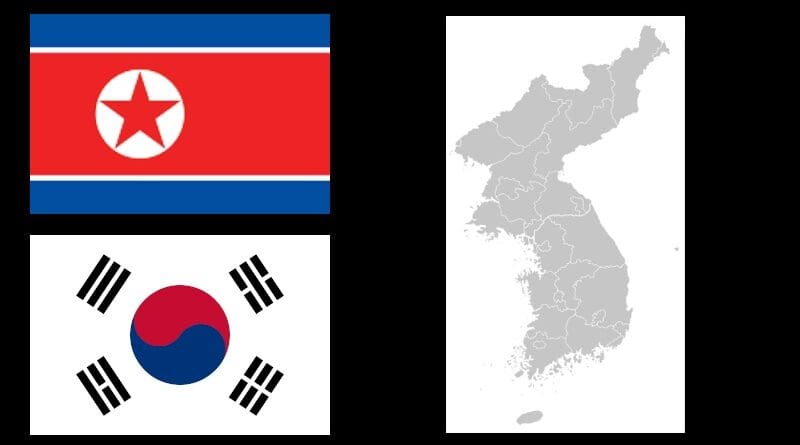Role Of The Four Major Powers In Maintaining Peace And Stability In Korean Peninsula – OpEd
The security situation on the Korean Peninsula seems to be deteriorating amid North Korean nuclear aggression and geopolitical rivalries among the major powers. Although the major powers – the United States, Japan, China, and Russia – are supposed to act as stabilizers of the inter-Korean conflict, their interests and mutual rivalries are only aggravating the situation. As evident as it is, the Korean Peninsula is currently grappling with the lingering inter-Korean tensions as well as suffering from the negative impacts of the Russian invasion of Ukraine and the Sino-U.S. strategic competition in the wider Indo-Pacific region. All these factors have hindered the maintenance of peace and stability in the Korean Peninsula.
As far as the United States is concerned, it is one of the oldest players in the geopolitical game in the Korean Peninsula. Being a staunch South Korean ally, the United States strongly criticizes North Korean aggression and conducts regular joint exercises with South Korea to enhance deterrence (Kunkle). In 2017, the United States also proposed deployment of THAAD on the Korean Peninsula to undermine North Korean nuclear capabilities however, it was aggressively countered by China through imposing economic sanctions on South Korea (Kim). However, now that South Korea has adopted a more pragmatic approach, the United States is also supporting South Korean defense reforms which have allowed the country to undertake a defense modernization program, increase defense spending, and add to its domestic arms production capabilities. South Korea is on the road to making itself militarily independent to rely less on its allies and counter North Korean aggression by all possible means (White).
As the major threat to peace and stability on the Korean Peninsula is North Korean aggression, Russia’s revisionist posture and its invasion of Ukraine have proved to be very influential factors. South Korea, the United States, and Japan worry that Russia’s revisionism challenges the status quo in the Korean Peninsula as it might drive North Korea to follow the same revisionist pattern of erasing the national border between North Korea and South Korea (Snyder). While the Russian invasion of Ukraine has largely expanded South Korean defense exports, it poses great challenges to its security and sovereignty (Tokola et al.). Moreover, Russia continues to support North Korea and has done little to bring peace and stability to the Korean Peninsula.
Similarly, China maintains closer ties with North Korea but is also a close trade partner of South Korea. North Korea acts as a buffer between China and the U.S. troops on the Korean Peninsula which makes a great factor in the current strategic competition between two superpowers (Kim). It is in Chinese interest to capitalize on diplomatic means to erode U.S. influence on the Korean Peninsula. While the United States has called on China to play a forward role in reducing inter-Korean tensions, China has done little to deter North Korean aggression and instead, continues to be a steadfast North Korean economic and military partner (Pak). Moreover, even though South Korea’s interests largely diverge from Chinese interests on the Korean Peninsula, the economic dependency makes it difficult for Seoul to achieve its goals (Kim).
So, the current dynamics on the Korean Peninsula revolve around great power rivalry and so does the peace and stability in the region. On one hand, Russia’s revisionist posture, Chinese economic and military partnership, and China’s attempts to undermine American influence in the region continue to aggravate North Korean nuclear actions. On the other hand, South Korea has adopted a defense modernization program to reduce its dependence on the United States to deter North Korean aggression. Moreover, while Japan stands with the United States on the Korean Peninsula’s equation, the relationship between Japan and South Korea is complex.
Japan perceives North Korea as a grave and imminent threat in its National Security Strategy and emphasizes strengthening defense relations and deterrence with the United States and South Korea to counter the North Korean threat (Sakata). Constitutional amendments have also allowed Japan to increase its defense spending and adopt a less reliant defense posture given increasing threat perceptions in the region (Singh).
Therefore, while the major powers are supposed to be playing a balancing role in the Korean Peninsula, the degree of relationship with the main parties – North Korea and South Korea – as well as their interests and newly developed great power contestation has shifted their role to that of aggravators. However, it is the need of the hour for major powers to overlook their differences and realize the gravity of tensions and the intensity of North Korean nuclear aggression. South Korea’s renewed focus on Six-Party Talks can be a significant and useful channel for major powers to put aside their differences and stress on the maintenance of peace and stability in the Korean Peninsula. The Six-Party Talks can provide avenues for cooperation and a plausible solution to the North Korean nuclear challenge.
References
- Kim, Jina. China and Regional Security Dynamics on the Korean Peninsula. Carnegie Endowment for International Peace, 2020. carnegieendowment.org/2020/03/18/china-and-regional-security-dynamics-on-korean-peninsula-pub-81235.
- Kunkle, Chad. “The US, its allies, and North Korea are one wrong move away from disaster.” INSIDER, 11 Mar. 2023, www.businessinsider.com/us-allies-north-korea-are-one-wrong-move-from-disaster-2023-3. Accessed 13 Mar. 2023.
- Pak, Jung H. China’s gambit on the Korean Peninsula. Brookings, 2020. www.brookings.edu/research/chinas-gambit-on-the-korean-peninsula/. Accessed 13 Mar. 2023.
- Sakata, Yasuyo. Japan’s National Security Strategy & the Two Koreas. STIMSON, 2023. www.stimson.org/2023/japans-national-security-strategy-the-two-koreas/. Accessed 13 Mar. 2023.
- Singh, Abhishek K. “Japan’s NSS and its impact on the Korean Peninsula.” Observer Research Foundation, 9 Jan. 2023, www.orfonline.org/expert-speak/japans-nss-and-its-impact-on-the-korean-peninsula/. Accessed 13 Mar. 2023.
- Snyder, Scott A. “Russia’s Invasion of Ukraine and Implications for the Korean Peninsula.” Council on Foreign Relations, 8 Mar. 2022. Accessed 13 Mar. 2023.
- Tokola, Mark, et al. “10 Issues to Watch for on the Korean Peninsula in 2023.” KEI, 31 Jan. 2023, keia.org/the-peninsula/10-issues-to-watch-for-on-the-korean-peninsula-in-2023/. Accessed 13 Mar. 2023.

